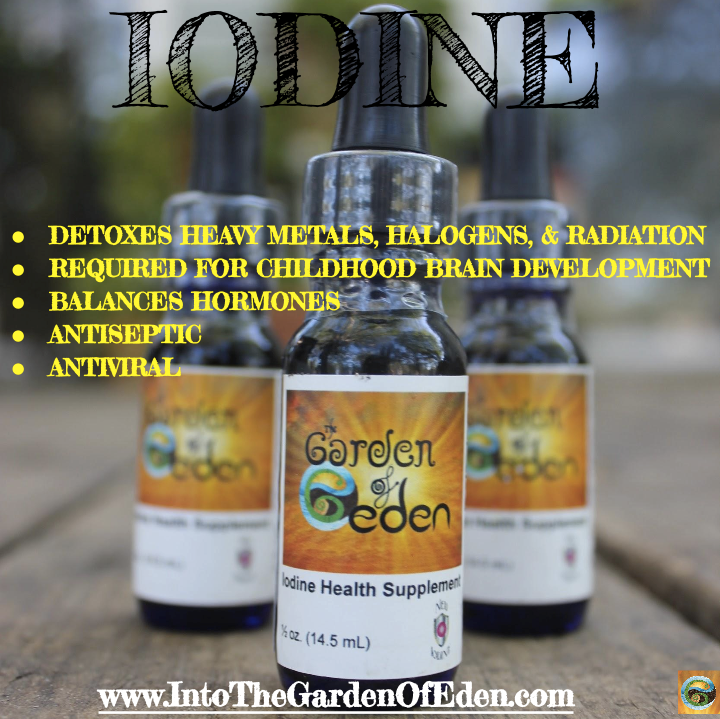Let us introduce you to the 53rd element on the periodic table.

Iodine is a vital nutrient required by every single cell in the body for optimal function. It regulates cellular nutrient uptake and waste expulsion, yet 95% of Americans are deficient in iodine.
The body needs iodine to optimize every single chemical reaction that takes place, but the body does not make iodine. You have to include it in your diet, but the standard western food supply is no longer a reliable source of proper amounts of iodine. PLUS competing halogens like bromine, chlorine, and fluorine are now prevalent in food, water, and air.
Modern agriculture practices have stripped the soil of iodine, and health-optimizing levels of this nutrient have not been abundant for decades. Uncooked, unprocessed sea vegetables are one of the only reliable food sources of iodine anymore, and we don’t know a lot of Americans who are consuming raw seaweed on a daily basis.
The FDA recommends 150 mcg of iodine per day, but this is only the bare minimum to prevent goiter. Women and expectant mothers need significantly higher amounts. Iodine is vital for proper brain development of the unborn fetus and growing children.
Given the rampant deficiency within the population, supplementation with higher levels of iodine is imperative. The Japanese population regularly consumes 5,000-13,000 mcg on a daily basis because of their ocean-centered diet, and they enjoy superior health to Americans with lower rates of obesity, cancer, diabetes, thyroid disease, and cystic conditions.
Morton began marketing iodized salt to prevent goiter in the 1920s. However, it is not iodine but iodide that is added to salt, along with chlorine in the manufacturing process. While goiter rates did decrease, the population is still not consuming the optimal form or amounts of iodine to maximize health. On top of that, the environment is polluted with halogens, heavy metals, and radiation, which compete with iodine receptors in the body.
Iodine is responsible for:
- Healthy thyroid and endocrine
function - Regulating metabolism
- Boosting energy levels
- Fighting infection
- Aids in regulating blood sugar
- Reducing body odors
- Improving cognitive function
- Proper development in children and expectant mothers
- Normal immune function
- Detoxifying heavy metals, halogens, and radiation
- Purifying water
- Kills parasites, bacteria, mold, yeast, protozoa, viruses
There are several forms of iodine, and not all of them are beneficial. Elemental iodine and radioactive iodine are a few forms that are actually dangerous for the body!
We offer NASCENT IODINE in 0.5 oz bottles for a $44 donation to our cause. This is the form that is most beneficial to the body; it is immediately absorbable, and no energy is wasted in converting it to useable form.
While we’re here on Steemit, we’re dedicated to helping as many people as possible. In upcoming posts, we’ll share our years of research and hundreds of testimonials to the efficacy of NASCENT IODINE and its power to optimize health and eradicate disease! We’ll expand on many of these issues, and address specific diseases and conditions that iodine supplementation benefits.
www.intothegardenofeden.com
Sources:
http://articles.mercola.com/sites/articles/archive/2011/03/25/how-to-protect-yourself-from-nuclear-radiation.aspx
http://www.laurapower.com/page26.html
Dr. David Brownstein. Iodine: why you need it, why you can’t live without it. 3rd Edition. Medical Alternatives Press, 2008.Iodine Deficiency and Endemic Goiter: A National Tragedy. Tina Kaczor, ND. Iodine and Cancer: A Summary of the Evidence to Date. Natural Medicine Journal.W. H. Shetaya, S. D. Young, M.J. Watts, E.L. Ander, E. H. Bailey. Iodine dynamics in soils. Geochimica et Cosmochimica Acta, Volume 77, 15 January 2012, Pages 457–473.

